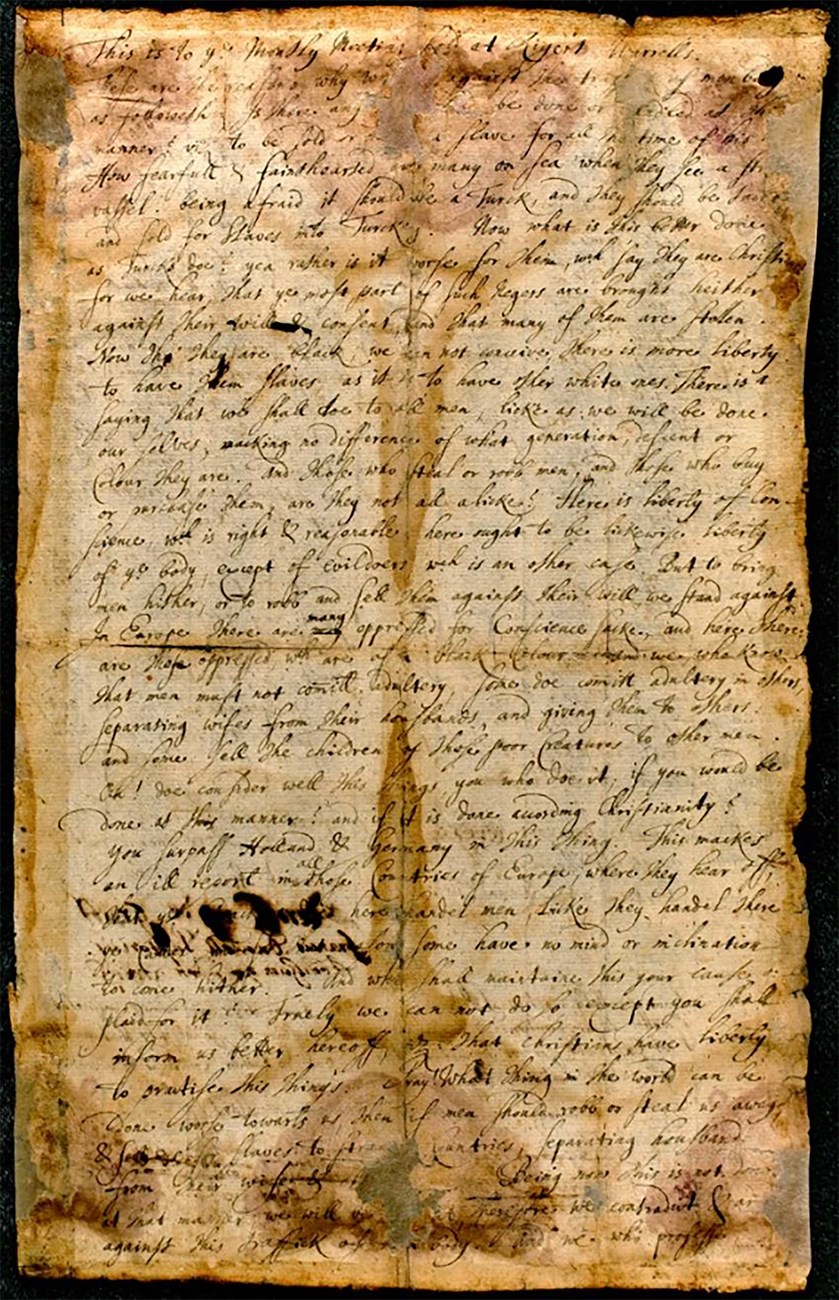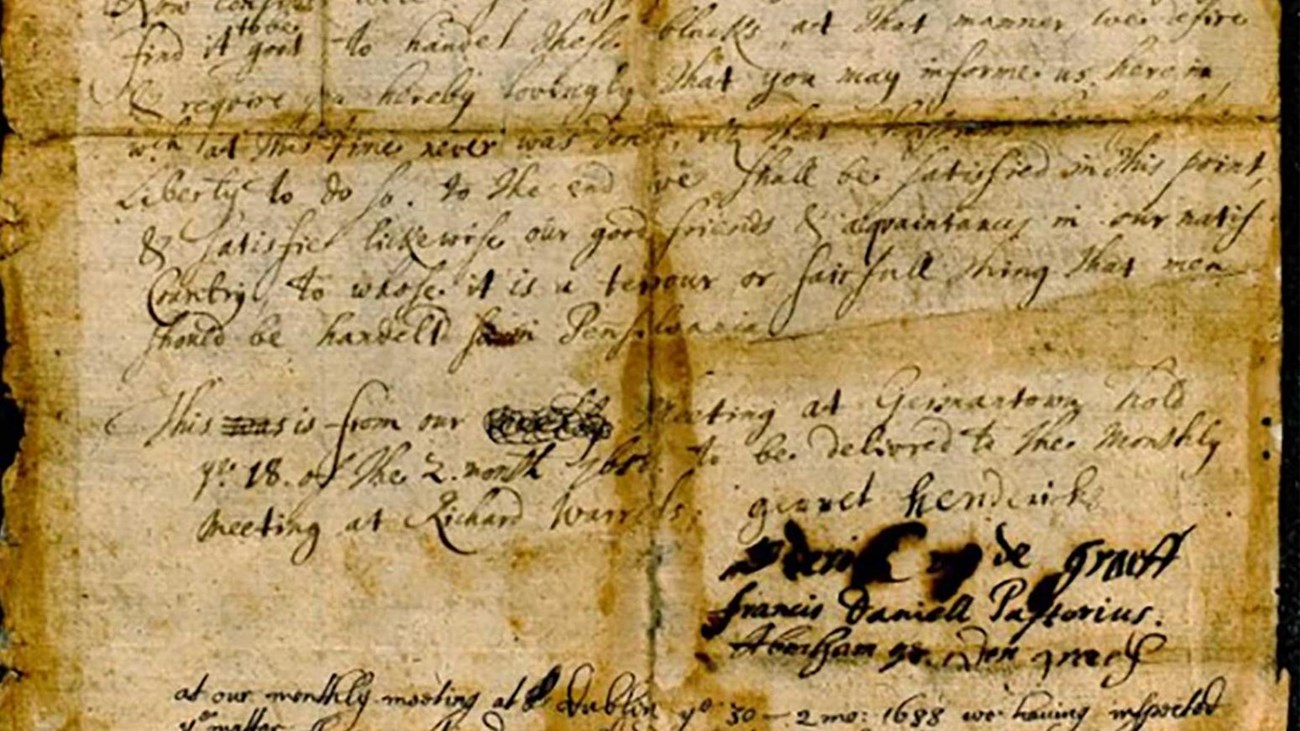Last updated: March 19, 2025
Article
Germantown Friends’ First Protest Against Slavery, 1688

Courtesy of Haverford College Quaker and Special Collections.
Title: Germantown Friends’ First Protest Against Slavery, 1688
Date: April 18, 1688
Object Information: 2 pages, oak gall ink on paper
Repository: Haverford College Quaker & Special Collections, Protests Against Slavery, HC.MC-975-11-055, https://digitalcollections.tricolib.brynmawr.edu/object/hc135384.
Description:
In 1688 four German Quakers gathered to write a petition to the Germantown Monthly Meeting to protest enslavement by Quakers in the colony. It was the first protest of its kind in the British North American colonies. Garret Hendericks, Francis Daniel Pastorius, along with brothers Derick op de Graeff and Abraham op De Graeff (cousins to William Penn) expressed their confusion and grief over why their Quaker brothers and sisters had utilized enslaved labor to build up the city despite preaching peace and acceptance. The group urged Quakers to practice what they preached, in saying "that we shall doe to all men like as we will be done ourselves." The petition was eventually presented at the Yearly Meeting in Burlington, New Jersey, where the vote was made not to take a stand for or against slavery.
Date: April 18, 1688
Object Information: 2 pages, oak gall ink on paper
Repository: Haverford College Quaker & Special Collections, Protests Against Slavery, HC.MC-975-11-055, https://digitalcollections.tricolib.brynmawr.edu/object/hc135384.
Description:
In 1688 four German Quakers gathered to write a petition to the Germantown Monthly Meeting to protest enslavement by Quakers in the colony. It was the first protest of its kind in the British North American colonies. Garret Hendericks, Francis Daniel Pastorius, along with brothers Derick op de Graeff and Abraham op De Graeff (cousins to William Penn) expressed their confusion and grief over why their Quaker brothers and sisters had utilized enslaved labor to build up the city despite preaching peace and acceptance. The group urged Quakers to practice what they preached, in saying "that we shall doe to all men like as we will be done ourselves." The petition was eventually presented at the Yearly Meeting in Burlington, New Jersey, where the vote was made not to take a stand for or against slavery.
Page 2 of the 1688 Protest

Page 2
The four German Quakers called for the end of the purchasing, robbing, and stealing of Black people in the colony as in Europe.
TRANSCRIPT
This is to ye monthly meeting hold at Rigert Warrells. These are the reasons why we are against the traffik of men-body, as followeth: Is there any that would be done or handled at this manner? viz., to be sold or made a slave for all the time of his life? How fearful & fainthearted are many on sea when they see a strange vassel. being afraid it should be a Turck, and they should be tacken, and sold for slaves into Turckey. Now what is this better done, as Turcks doe? yea, rather is it worse for them wch say they are Christians, for we hear that ye most part of such negers are brought heither against their will & consent and that many of them are stollen. Now tho they are black, we can not conceive there is more liberty to have them slaves, as it is to have other white ones. There is a saying that we shall doe to all men licke as we will be done ourselves; macking no difference of what generation, descent or Colour they are. and those who steal or robb men, and those who buy or purchase them, are they not all alicke? Here is liberty of conscience wch. is right and reasonable; here ought to be likewise liberty of ye body, except of evildoers, wch is an other case. But to bring men hither, or to robb and sell them against their will, we stand against. In Europe there are many oppressed for Conscience sacke; and here there are those oppressed wch are of a Black Colour. and we who know that men must not comitt adultery, some doe comitt adultery in others, separating wifes from their housbands, and giving them to others. and some sell the children of those poor Creatures to other men. Ah! doe consider well this things, you who doe it, if you would be done at this manner? and if it is done according Christianity? You surpass Holland and Germany in this thing. This mackes an ill report in all those Countries of Europe, where they hear off, that ye Quackers doe here handel men licke they handel there ye Cattle. and for that reason some have no mind or inclination to come hither. And who shall maintaine this your cause, or plaid for it? Truely we can not do so, except you shall inform us better hereoff, viz: that christians have liberty to practise this things. Pray, what thing in the world can be done worse towards us, then if men should robb or steal us away, & sell us for slaves to strange Countries, separating housband from their wife and children. Being now this is not done at that manner we will be done at, therefore we contradict & are against this traffic of men body. And we who profess
Page 2
that it is unlawfull to steal, must lickewise avoid to purchase such things as are stollen, but rather help to stop this robbing and stealing if possibel. and such men ought to be delivered out of ye hands of ye Robbers, & made free as well as in Europe. Then is Pensilvania to have a good report, in stead it hath now a bad one for this sacke in other Countries. Especially whereas ye Europeans are desirous to know in what manner ye Quackers doe rule in their Province, & most of them doe loock upon us with an envious eye. But if this is done well, what shall we say is done evill? If once these slaves (wch they say are so wicked and stubbern men) should joint themselves, fight for their freedom and handel their masters & mastrisses, as they did it, handel them before; will these masters & mastrisses tacke the sword at hand and warr against these poor slaves, licke we are able to belive, some will not refuse to doe? or have these negers not as much right to fight for their freedom, as you have to keep them slaves? Now consider well this thing, if it is good or bad? and in case you find it to be good to handel these blacks at that manner, we desire & require you hereby lovingly that you may informe us herein, wch at this time never was done, viz. that Christians have such a liberty to do so. To the end we shall be satisfied in this point, & satisfie lickewise our good friends and acquaintances in our natif Country, to whose it is a terrour, or fairfull thing that men should be handeld so in Pensilvania.
This is from our meeting at Germantown, hold ye 18 of the 2 month, 1688, to be delivered to the Monthly Meeting at Richard Warrels.
gerret hendericks
Derick op de graeff
Francis Daniell Pastorius
Abraham op Den graef
at our monthly meeting at Dublin, ye 30 - 2 mo: 1688, we having inspected ye matter above mentioned & considered of it we find it so weighty that we think it not Expedient for us to meddle with it here, but do Rather commit it to ye consideration of ye Quarterly meeting ye tennor of it being nearly Related to ye truth. On behalf of ye monthly meeting, Signed,
P. Jo. Hart.
This, above mentioned, was read in our quarterly meeting at Philadelphia, the 4 of ye 4th mo. '88, and was from thence recommended to the Yearly Meeting, and the above said Derick, and the other two mentioned therein, to present the same to ye above said meeting, it being a thing of too great a weight for this meeting to determine. Signed by ord ye meeting, Anthony Morris.
Note: A transcribed broadside version of this protest petition can be found here: Germantown Friends' protest against slavery 1688. [Facsimile]. | Library of Congress.
